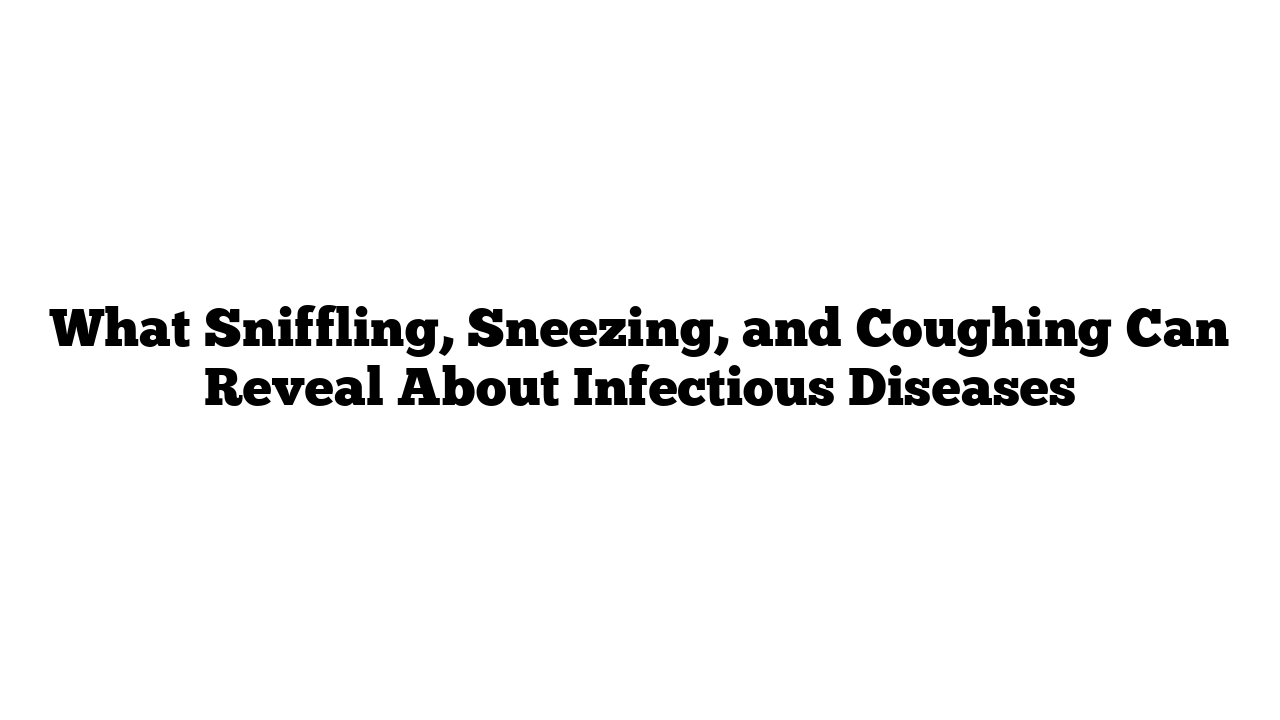Every sniffle, sneeze, and cough we experience often feels like a minor inconvenience. However, these symptoms can sometimes signal something much more significant—an infectious disease. Recognizing these signs early can make a difference in managing your health and preventing the spread of illness to others.
In this article, we’ll explore the common causes of sniffling, sneezing, and coughing, what these symptoms indicate, and how to take action to protect yourself and those around you.
What Are Infectious Diseases?
Infectious diseases are caused by microorganisms like bacteria, viruses, fungi, or parasites. These illnesses are often spread through direct contact, respiratory droplets, contaminated surfaces, or even insect bites. Recognizing early symptoms is critical to prevent complications and transmission.
Sniffling, Sneezing, and Coughing: What Do They Mean?
These symptoms are common responses by your body to irritants or infections. While they may seem similar, each has unique implications:
1. Sniffling
- Cause: Excess mucus production in the nasal passages.
- What It Indicates:
- Viral Infections: Colds, influenza, or COVID-19.
- Allergies: Seasonal or environmental triggers like pollen or dust.
- Sinus Infections: Bacterial infections causing sinus inflammation.
2. Sneezing
- Cause: Reflex triggered by irritants in the nose.
- What It Indicates:
- Common Cold: Early-stage viral infections often involve sneezing.
- Allergic Rhinitis: Persistent sneezing due to allergens like mold or pet dander.
- Irritants: Exposure to strong smells or pollution.
3. Coughing
- Cause: Body’s way of clearing airways from mucus, irritants, or pathogens.
- What It Indicates:
- Acute Respiratory Infections: Such as bronchitis, pneumonia, or COVID-19.
- Asthma: Coughing accompanied by wheezing or shortness of breath.
- Chronic Conditions: Conditions like chronic obstructive pulmonary disease (COPD).
Common Infectious Diseases Associated with These Symptoms
1. The Common Cold
- Cause: Viruses, primarily rhinoviruses.
- Symptoms: Sniffling, sneezing, mild cough, sore throat, and fatigue.
- Prevention: Frequent handwashing and avoiding close contact with sick individuals.
2. Influenza (Flu)
- Cause: Influenza viruses.
- Symptoms: Fever, chills, body aches, along with sniffling and coughing.
- Prevention: Annual flu vaccinations and good hygiene practices.
3. COVID-19
- Cause: SARS-CoV-2 virus.
- Symptoms: Cough, fever, fatigue, and loss of taste or smell.
- Prevention: Vaccination, wearing masks, and maintaining social distance.
4. Sinusitis
- Cause: Bacterial or viral infections.
- Symptoms: Persistent sniffling, facial pain, and pressure.
- Treatment: Hydration, nasal sprays, and antibiotics for bacterial infections.
5. Whooping Cough (Pertussis)
- Cause: Bordetella pertussis bacteria.
- Symptoms: Severe coughing fits, sneezing, and runny nose.
- Prevention: Vaccination (DTaP and Tdap).
6. Tuberculosis (TB)
- Cause: Mycobacterium tuberculosis bacteria.
- Symptoms: Chronic coughing, weight loss, night sweats, and fever.
- Treatment: Long-term antibiotics under medical supervision.
How to Differentiate Between Allergies and Infections
It’s easy to confuse allergies with infectious diseases since both can cause similar symptoms. Here’s how to tell the difference:
| Symptom | Allergies | Infections |
|---|---|---|
| Sniffling | Often watery discharge | May be thick and yellow/green |
| Sneezing | Persistent, often in bouts | Sporadic, depending on the infection |
| Fever | Rare | Common in bacterial and viral infections |
| Duration | Weeks to months | Usually a week or two |
When to Seek Medical Help
While sniffling, sneezing, and coughing are often harmless, they may indicate more serious conditions if accompanied by:
- High fever.
- Shortness of breath.
- Persistent symptoms lasting more than 10 days.
- Chest pain or severe fatigue.
Tips to Prevent Infectious Diseases
1. Practice Good Hygiene
- Wash your hands regularly with soap and water.
- Avoid touching your face, especially your nose and mouth.
2. Strengthen Your Immune System
- Eat a balanced diet rich in fruits and vegetables.
- Stay hydrated and get enough sleep.
3. Get Vaccinated
Vaccinations are essential to protect against diseases like the flu, COVID-19, and whooping cough.
4. Avoid Close Contact
Keep a safe distance from individuals showing symptoms of illness.
Trusted Resources for More Information
- Visit MedicalTimes.io for expert health updates and actionable tips.
- Learn more about respiratory infections at CDC.
- Get allergy insights and prevention tips from AAFA.
- Explore flu prevention measures at WHO.
Top 10 Frequently Asked Questions (FAQs)
1. Can sniffling indicate a serious illness?
Not always, but if it persists with other symptoms like fever, consult a doctor.
2. How can I differentiate between a cold and allergies?
Allergies rarely cause fever and often last longer than colds.
3. Is coughing always related to infections?
No, coughing can also result from irritants like smoke or chronic conditions like asthma.
4. How do I stop sneezing quickly?
Identify and remove the trigger (dust, pollen, etc.) and use an antihistamine if needed.
5. Can I get sick from someone sneezing near me?
Yes, respiratory droplets can spread infections like colds or flu.
6. When should I see a doctor for a cough?
If it lasts more than three weeks, is severe, or is accompanied by blood or chest pain.
7. Can sniffling be caused by stress?
Stress may aggravate conditions like allergies, leading to sniffling.
8. Are over-the-counter medicines effective for these symptoms?
Yes, but they address symptoms, not the root cause.
9. Is it safe to exercise while coughing?
Light exercise may be okay, but avoid strenuous activity if you’re unwell.
10. How can I protect others if I’m sick?
Cover your mouth while coughing or sneezing and stay home if possible.
